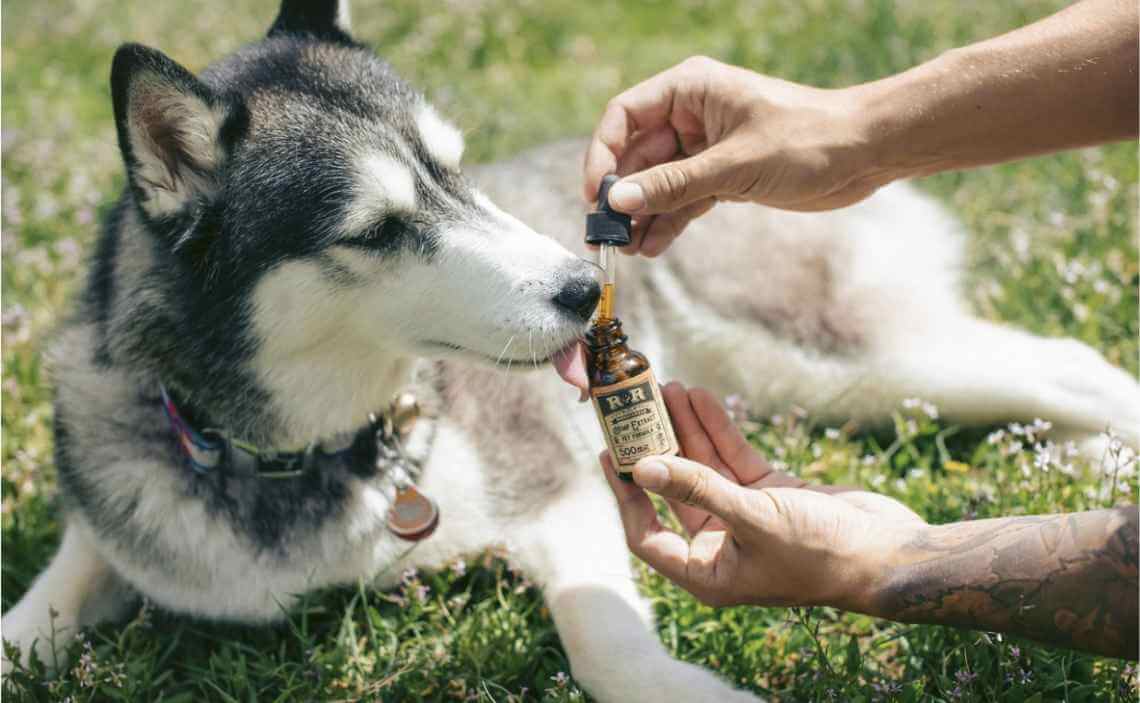
Disclaimer: The purpose of this post is to provide non-biased information about cannabis and what you should know before you speak with your veterinarian about the use of cannabis for your dog. It is not intended to provide medical advice about whether you should – or should not – give cannabis to your dog.
Cannabis is an option for people seeking relief from various ailments in Colorado. As new research continues to emerge, pet parents and veterinarians alike are finding medical cannabis can provide positive benefits for dogs as well. It is important that you know the facts before speaking with your veterinarian about giving cannabis to your dog.

Cannabis-Related Definitions
Let’s start with a few definitions so we are all on the same page.
- Cannabis – a genus of plants that include both marijuana and hemp
- Hemp – classified with marijuana as a Schedule 1 substance until December 2018 when the Agriculture Improvement Act was passed by Congress. Hemp contains higher concentrations of CBD and relatively lower concentrations of THC compared to marijuana. Today hemp is legal throughout the U.S.
- Marijuana – marijuana is still a Schedule 1 controlled substance at the federal level. Marijuana is fully legal in Colorado under state law. Marijuana contains a higher concentration of THC and lower concentration of CBD than hemp.
- Cannabinoids (CBDs) – naturally occurring compounds found in hemp and marijuana. They have been found to have antioxidant properties, which make them useful in the treatment of various ailments, especially ischemic, age-related, inflammatory and autoimmune diseases.
- Tetrahydrocannabinol (THC) – THC is the primary psychoactive compound in marijuana that gives the sensation of being “high”.
- Endocannabinoid system – mammals (humans and dogs included) produce their own endogenous cannabinoids. There are two endocannabinoid receptors – CB1 and CB2. When a particular cannabinoid or combination of cannabinoids attach to specific receptors, it triggers a change in the way the cells send signals to other cells throughout the body.
- CB1 receptors – CB1 receptors work primarily on the brain and are predominately located in the central and peripheral nervous systems.
- CB2 receptors – CB2 receptors work mainly in the body and are found mostly in the immune system.
How Does Cannabis Work in Canines?
CBDs affect the endocannabinoid receptors (ECS) which are present in the central and peripheral nervous systems of mammals. The ECS controls the chemicals that our brain and cells use as neurotransmitters. CBD regulates neural transmissions needed to keep the body in a normal and healthy state. The really amazing thing about CBD is that it can both up-regulate and down-regulate neural transmissions. This is an important factor because all other known pharmaceuticals can either only up-regulate or down-regulate (think of stimulants or suppressants that only work in one direction and not necessarily into a homeostatic state). This ability of CBD to regulate the body toward homeostasis reduces or eliminates unwanted side effects.
Dogs have a similar endocannabinoid system as humans. In addition, humans and canines have approximately 95 percent similar genetic material, so we are susceptible to many of the same illnesses and diseases (i.e. diabetes, obesity, arthritis, etc.)
It is VERY IMPORTANT to note that dogs have a higher number of brain receptors for CBDs than humans, making much easier for dogs to experience the psychoactive side effect of THC than humans.

Is CBD Safe for Canines?
There is limited research that indicates CBD derived from hemp is safe for dogs.
A study conducted by Dr. Stephanie McGrath at the Colorado State Veterinary College found CBD to be harmless for dogs. However, this was a significantly small study (it only studied 16 dogs over a short period of time). More research is needed for veterinarians to feel comfortable about prescribing CBDs and other cannabinoids for the treatment of disease in dogs.
Today, much of the CBD oil used for medicinal purposes is sourced from hemp because it has a higher concentration of CBD and a lower concentration of THC than products sourced from marijuana. It is believed that hemp-based CBD is better for canines due to their propensity to experience faster and stronger psychoactive side effects.
Oil is the best delivery system for dogs because it provides the most bioavailability, which is what you need for the drug to be effective.
Are the Claims that CBD is Helpful for Canines True?
While many people swear by CBD for their dogs, there’s very little research to back up their claims.
Currently, there are only two animal studies on the effects of CBD on dogs.

Study #1: 2016 Colorado State University Pilot Study on Epileptic Canines
This study was conducted by Dr. Stephanie McGrath, a veterinary neurologist. Her research found that nearly 90 percent of the epileptic dogs in the study experienced fewer seizures when given chicken-flavored CBD, as opposed to 20 percent on placebo.
While encouraging, Dr. McGrath acknowledges the limitations of this study and agrees that more research needs to be done. She is currently conducting two clinical trials with 27 dogs to determine how effective CBD can treat osteoarthritis and epilepsy.
Study #2: 2018 Cornell University Study on Canines with Multi-Joint Pain and Osteoarthritis
The second study was conducted by Dr. Joseph Wakshlag to determine the effects of CBD on osteoarthritis, joint pain and decreased appetite. Of the 16 dogs that were studied, 80 percent showed significant improvement. Again, the number of dogs included in the study was significantly small.
Neither of these research studies has been scientifically reviewed.

Does CBD Work for Canine Disease and Ailments?
In a word – maybe. The two studies that have been conducted are encouraging but since the sample size of both studies were limited no definitive conclusions can be drawn.
What About the Claims that CBD Works for Canines?
CBD manufacturers are taking a big leap when they correlate research on humans and treating dogs with CBD products.
Dogs and humans have a common endocannabinoid system – so if it works for humans, why wouldn’t it work for dogs?
This is not an unreasonable assumption. However, veterinarians still don’t have enough research to support this assumption.
The Scientific Link to Synthetic CBD for Humans
Since human and other mammals have a common ECS system, it is worth noting the research on the effects of CBD on humans. The FDA has approved three synthetic CBD products, Marinol, Syndros and Cesamet for a variety of conditions. This is significant because we know there is evidence-based research indicating cannabinoids are effective in the following human conditions:
- Anorexia in AIDs patients
- Nausea and vomiting in cancer patients receiving chemotherapy
- Control of acute and chronic pain
- Lack of appetite
- Epilepsy in children
So, by extension, CBD pet cannabis manufacturers are claiming their products are effective for dogs to treat the following conditions:
- Pain control
- Osteoarthritis
- Epilepsy
- Seizure disorders
- Appetite stimulation

Significant Unknowns: Sources, Dosage and Labels
The cannabis industry is still very new with many issues to work out. One of these has to do with the source of the CBD being used. Is it originating from hemp? Where does the hemp come from? There is evidence that Chinese or Eastern European sources contain high concentrations of heavy metals and pesticides.
How is your product manufactured? Smaller manufacturers may have poor or no quality controls in place and may not have the ability to test for the concentration of CBD and THC in their products.
Another major issue has to do with how much product to administer. Little is known about what doses are effective or safe because the research conducted has used such small sample sizes and is therefore not statistically valid. For example, Dr. McGrath is nearly doubling the dose in her second trial. In her first trial she administered a dose of 2.5 mg per kilogram twice daily.
Furthermore, most CBD products are mislabeled. In a 2017 study conducted at the University of Pennsylvania’s Perelman School of Medicine found that nearly 70 percent of CBD products analyzed were mislabeled. Some were over-labeled and others were under-labeled, and still others contained enough THC to intoxicate or impair a person. The FDA conducted a similar study and found that label claims rarely matched the actual THC content of the product.
To overcome this issue consumers can obtain a Certificate of Analysis from a third-party lab or find domestically-grown products that have a Certificate of Analysis available for viewing.
Why Your Veterinarian Doesn’t Prescribe CBD for Canines
Your veterinarian doesn’t prescribe CBD because they are not allowed to do so, and most are not prepared to do so anyway, for the following reasons:
- No scientifically reviewed research papers on the use of CBD in dogs
- There are no research studies on the therapeutic dosage required for any canine illness
- Quality and efficacy of the CBD products on the market is not standardized or checked
- Uncertainty related to actual product contents and labeling
- The long-term effect of CBD use in dogs has not been studied

Summary and Tips
To summarize, there isn’t enough research to reliably find that CBD oil is helpful for canines. However, if you decide to give CBD oil to your dog, keep these suggestions in mind:
- Oils are safer for pets than edibles. This is because you have more control over dosage (the CBD in edibles is dissolved in butter so it is likely not spread evenly throughout the product) and oils are more bioavailable.
- Be patient. Start with a low dose and gradually increase. It may take time for the effects of CBD to be observable in dogs.
- Have your veterinarian check your dog’s liver enzymes two weeks after starting treatment to ensure your dog’s alkaline phosphatase (ALP) levels are within normal levels.
- Use hemp-based CBD oil because it has much lower levels of THC, which can have a significant impact on your dog.
- Stay away from powder products as they tend to lead to problems in the liver.
- Only use products with a Certificate of Analysis.
- CBD oil should be kept at room temperature and way from bright light or sunlight. Cannabinoids are susceptible to degradation. If the oil has changed color, discard it.
Have you used CBD oil to treat a medical condition in your dog? Did it help? Please share your experience with the rest of the Canine Campus community in the comments below…

 Cranial Cruciate Ligament Rupture in Dogs
Cranial Cruciate Ligament Rupture in Dogs Why Do Dog Teeth Get Worn Down?
Why Do Dog Teeth Get Worn Down? FDA Warns Bone Treats May Be Deadly for Your Dog
FDA Warns Bone Treats May Be Deadly for Your Dog What Can Dogs Drink Besides Water? Exploring Safe and Healthy Alternatives
What Can Dogs Drink Besides Water? Exploring Safe and Healthy Alternatives Grain-Free Diets and Heart Disease in Dogs
Grain-Free Diets and Heart Disease in Dogs






I have an 11 year old ChiPin (Chihuahua + Min Pincher) that I got from rescue. He had been abused and he’s got some problems with his shoulders to the point he’s bow legged.
I’ve had him on CBD since I got him, because he’s so old and he is in great health, happy, affectionate and he’s living his best life. I haven’t had him off the CBD but I believe it has helped him adjust and trust us. He’s very sedate, which is why I’m so glad I let him choose me as his best friend. He likes to sleep between our legs on the recliner, doesn’t bark (but he can) eats his food carefully and has no separation anxiety.
He’s the best room mate I’ve ever had. I believe the CBD works for him and his generally calm personality.
Thank you for sharing your experience with CBD with other dog lovers. We appreciate your input!